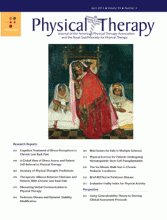Abstract
Background The newly developed Brief–Balance Evaluation System Test (Brief-BESTest) may be useful for measuring balance and predicting falls in individuals with Parkinson disease (PD).
Objectives The purposes of this study were: (1) to describe the balance performance of those with PD using the Brief-BESTest, (2) to determine the relationships among the scores derived from the 3 versions of the BESTest (ie, full BESTest, Mini-BESTest, and Brief-BESTest), and (3) to compare the accuracy of the Brief-BESTest with that of the Mini-BESTest and BESTest in identifying recurrent fallers among people with PD.
Design This was a prospective cohort study.
Methods Eighty participants with PD completed a baseline balance assessment. All participants reported a fall history during the previous 6 months. Fall history was again collected 6 months (n=51) and 12 months (n=40) later.
Results At baseline, participants had varying levels of balance impairment, and Brief-BESTest scores were significantly correlated with Mini-BESTest (r=.94, P<.001) and BESTest (r=.95, P<.001) scores. Six-month retrospective fall prediction accuracy of the Brief-BESTest was moderately high (area under the curve [AUC]=0.82, sensitivity=0.76, and specificity=0.84). Prospective fall prediction accuracy over 6 months was similarly accurate (AUC=0.88, sensitivity=0.71, and specificity=0.87), but was less sensitive over 12 months (AUC=0.76, sensitivity=0.53, and specificity=0.93).
Limitations The sample included primarily individuals with mild to moderate PD. Also, there was a moderate dropout rate at 6 and 12 months.
Conclusions All versions of the BESTest were reasonably accurate in identifying future recurrent fallers, especially during the 6 months following assessment. Clinicians can reasonably rely on the Brief-BESTest for predicting falls, particularly when time and equipment constraints are of concern.
Footnotes
All authors provided concept/idea/research design. Dr Duncan and Dr Earhart provided writing and data analysis. Dr Duncan, Dr Leddy, and Dr Earhart provided data collection. Dr Dibble, Dr Foreman, and Dr Earhart provided project management, study participants, and facilities/equipment. Dr Leddy, Dr Dibble, Dr Ellis, Dr Ford, Dr Foreman, and Dr Earhart provided fund procurement. Dr Foreman provided institutional liaisons. Dr Leddy, Dr Dibble, Dr Ellis, Dr Ford, Dr Foreman, and Dr Earhart provided consultation (including review of manuscript before submission).
This study was approved by the Human Research Protection Office at Washington University.
This work was funded by the Davis Phinney Foundation, Parkinson's Disease Foundation, and NIH UL1 TR000448. The funding source had no impact or input on the design, conduct, or reporting of this study. Thanks to Vanessa Heil-Chapdelaine, Samantha Herriott, and Brian Morrell for data entry.
- Received July 17, 2012.
- Accepted November 13, 2012.












